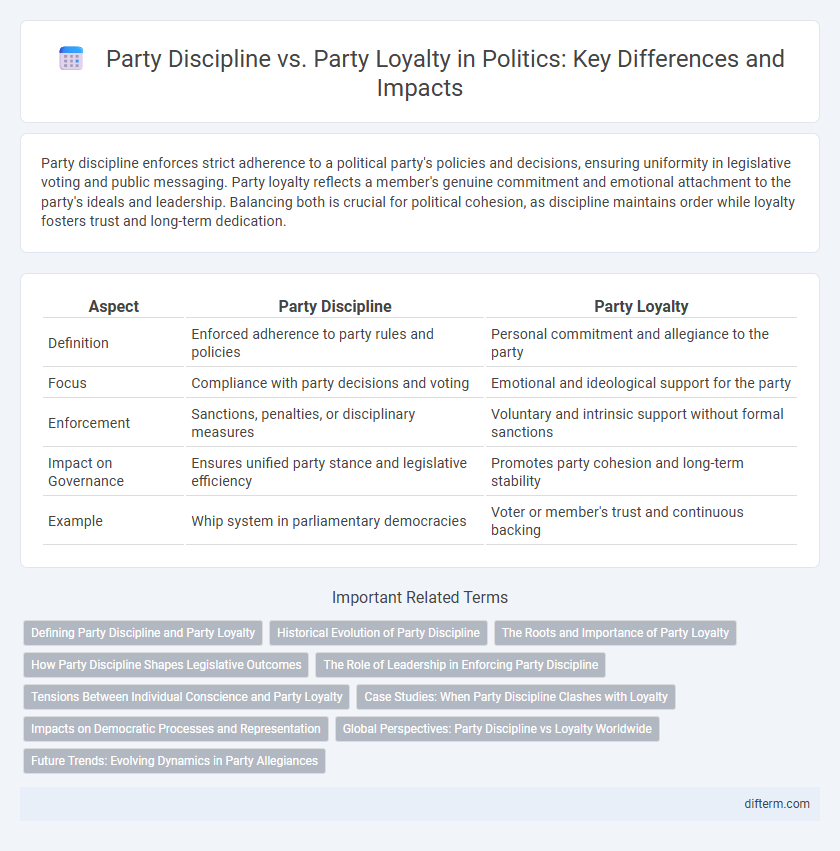Party discipline enforces strict adherence to a political party's policies and decisions, ensuring uniformity in legislative voting and public messaging. Party loyalty reflects a member's genuine commitment and emotional attachment to the party's ideals and leadership. Balancing both is crucial for political cohesion, as discipline maintains order while loyalty fosters trust and long-term dedication.
Table of Comparison
| Aspect | Party Discipline | Party Loyalty |
|---|---|---|
| Definition | Enforced adherence to party rules and policies | Personal commitment and allegiance to the party |
| Focus | Compliance with party decisions and voting | Emotional and ideological support for the party |
| Enforcement | Sanctions, penalties, or disciplinary measures | Voluntary and intrinsic support without formal sanctions |
| Impact on Governance | Ensures unified party stance and legislative efficiency | Promotes party cohesion and long-term stability |
| Example | Whip system in parliamentary democracies | Voter or member's trust and continuous backing |
Defining Party Discipline and Party Loyalty
Party discipline refers to the enforcement of party rules and policies, ensuring members vote and act in alignment with the party's official stance to maintain cohesive decision-making. Party loyalty emphasizes the emotional and moral allegiance of members to their political party, often reflected in consistent support beyond formal obligations. Distinguishing between the two highlights how discipline structures behavior through rules, while loyalty is driven by personal commitment to party ideals and goals.
Historical Evolution of Party Discipline
Party discipline has evolved significantly since the 19th century, transitioning from loosely organized factions to highly structured modern political organizations with formal rules enforced by party whips. Early political parties, such as the British Conservative and Liberal parties, gradually institutionalized mechanisms to ensure members voted in line with party policies, enhancing legislative cohesion. This historical evolution reflects the increasing importance of centralized control to maintain party unity and effectively implement political agendas within parliamentary systems.
The Roots and Importance of Party Loyalty
Party loyalty originates from shared ideology, common goals, and the historical development of political organizations that foster collective identity among members. It serves as the foundation of party discipline by ensuring consistent voting behavior and unified policy stances critical for legislative success. Maintaining strong party loyalty enhances political stability and reinforces voter trust by presenting a cohesive and reliable political front.
How Party Discipline Shapes Legislative Outcomes
Party discipline enforces adherence to a political party's agenda, ensuring cohesive voting patterns that streamline legislative processes and increase the likelihood of passing bills aligned with the party's platform. Strong party discipline mitigates intra-party dissent, enabling leadership to mobilize votes efficiently, which directly impacts the speed and success of legislative decision-making. Consequently, party discipline shapes legislative outcomes by aligning individual legislators' actions with collective party strategies, often outweighing personal or constituency preferences.
The Role of Leadership in Enforcing Party Discipline
Effective party leadership plays a crucial role in enforcing party discipline by setting clear expectations and consequences for dissent, thereby ensuring cohesion within legislative bodies. Leaders utilize strategic tools such as whip systems, rewards, and sanctions to maintain alignment with party policies and agendas. This enforcement fosters a unified front, which is essential for passing legislation and sustaining political power.
Tensions Between Individual Conscience and Party Loyalty
Tensions between individual conscience and party loyalty often challenge party discipline in political systems, as elected representatives must balance personal beliefs with collective party goals. Strict party discipline enforces voting along party lines, sometimes at the expense of lawmakers' ethical judgments or constituent interests. This dynamic creates ongoing debates about democratic representation, accountability, and the role of dissent within political parties.
Case Studies: When Party Discipline Clashes with Loyalty
Case studies reveal that party discipline enforces uniform voting behavior, often clashing with individual legislators' loyalty to local constituents or personal beliefs. In instances like the UK Conservative Party's Brexit splits, strict party whips led to defections as MPs prioritized regional interests over party mandates. These conflicts highlight the tension between maintaining cohesive policy agendas and respecting diverse representative responsibilities within political parties.
Impacts on Democratic Processes and Representation
Party discipline enforces uniform voting and behavior among members, often streamlining legislative processes but potentially suppressing individual representation and dissenting views. Party loyalty fosters long-term commitment to shared values and policies, enhancing cohesion but sometimes prioritizing party interests over constituents' needs. The balance between discipline and loyalty critically shapes democratic accountability, influencing how effectively elected officials represent diverse populations within political systems.
Global Perspectives: Party Discipline vs Loyalty Worldwide
Party discipline varies significantly worldwide, with strong enforcement in countries like China and Vietnam, where centralized control mandates strict adherence to party lines, contrasting with liberal democracies such as the United States and India where party loyalty is valued but individual autonomy among legislators is more tolerated. In European parliamentary systems like the UK and Germany, party discipline is critical for maintaining coalition stability and legislative efficiency, whereas in multiparty systems like Brazil and Italy, loyalty can be more fluid, reflecting the complexities of political alliances. Comparative studies reveal that party discipline's strength directly influences policymaking effectiveness and political stability, highlighting global differences shaped by institutional structures and electoral systems.
Future Trends: Evolving Dynamics in Party Allegiances
Future trends in party allegiances indicate a shift from rigid party discipline toward more fluid expressions of party loyalty, as politicians balance personal convictions with constituent demands. Digital communication and social media amplify individual voices, reshaping traditional party structures and encouraging diverse policy stances within parties. These evolving dynamics suggest increased fragmentation and realignment, influencing legislative cohesion and electoral strategies in the coming decade.
party discipline vs party loyalty Infographic

 difterm.com
difterm.com